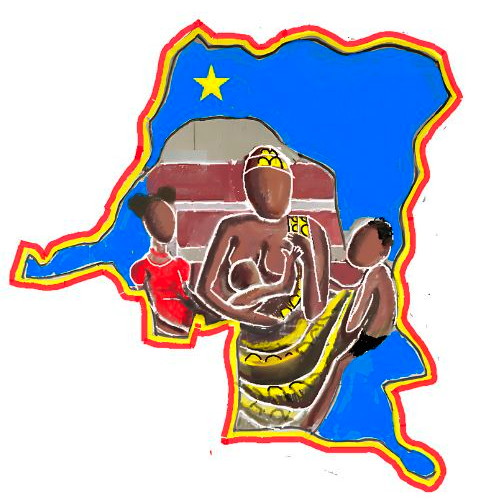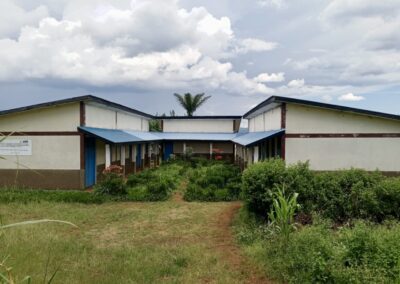Our project
Home for streetchildren
Home for Street Children ODV was established to support a project for the most vulnerable children and women in Mwenga territory, South Kivu, DRC.
The project came about thanks to collaboration with the local nonprofit association ” Msaada kwa Wanyonge asbl” ( in Kiswahili support for vulnerable people) created by Dr. Ilaria Moneta (pediatrician) together with local partners, in particular Dr. Darock Mukobwela Lukula, director of Mwenga Hospital, who is its president.
Project Description.
After long preparations, we finally opened our doors on August 2024 to the first group of children aged 2 to 13, mostly from the nearby town of Kamituga.
This is a city that is expanding rapidly because of the mostly artisanal exploitation of the gold, coltan, cassiterite and other mines that surround the city and are numerous throughout.
The soil is extremely rich in minerals.
Such exploitation, while enriching a few people, causes great misery.
Many children are orphaned because of the death of their parents from mining accidents, tuberculosis or HIV (the incidence of often multi-resistant tuberculosis is very high, but official data are lacking).
Numerous children are abandoned because their parents leave to work in the mines or in prostitution.
Many thus remain on the street and often end up working in the mines.
The difficulties we are encountering are many, of all kinds, but together with the local community, we believe in this project and want to continue it.
The needs, especially in Kamituga, are immense; the level of education throughout Mwenga is very low.
Many of our children between the ages of 11 and 13 can barely write their names.
We would still like to set up trade training schools ( carpentry, sewing, handicrafts etc.) for young people from 15 years of age, who are too old to be accommodated in our center, but who are at risk of ending up in prostitution, crime, and/or work in the mines.
This will enable them, in the long run, to take charge of themselves and especially to help others in the future
We will need your help to be able to carry out this project as well, and to be able to continue the work with the children already selected and give them a good education.
We also have room to accommodate several more children!
The current situation
Kamituga is a growing town in Mwenga Territory, South Kivu, a region rich in minerals such as gold, coltan, wolframite, cassiterite and copper. Many people come to the city from all over the province and surrounding regions, seeking work, consisting mainly of artisanal mining and deforestation. Minerals are extracted using rudimentary methods, and exploitation of women and children in artisanal mines is unfortunately common: women are usually assigned to carry heavy loads, and children used to advance in narrow tunnels dug into the earth. Fatal accidents are common. Living conditions in the mining areas and downtown Kamituga, located on a major trade axis linking Bukavu (provincial capital) to the Mwenga region, encourage promiscuity and prostitution. The incidence of HIV and tuberculosis is particularly high. The abandonment of agriculture for mining work leads to a dependence on produce from Bukavu, but the condition of the only unpaved road connecting the two towns, which becomes impassable for almost the entire duration of the long rainy season, makes the cost of living very expensive for the locals, resulting in malnutrition and the abandonment of the household by children in search of food.
The population of street children (orphans, runaways, abandoned, and children who have fled conflict areas in North Kivu, where the civilian population continues to be massacred by M23 rebel groups) is growing rapidly, especially in the country’s large eastern cities (Bukavu and Goma), but also in the smaller urban center of Kamituga, where the estimated population is approx. 300,000, but expanding rapidly. A census has not been taken throughout the country for many years. Adding to the large number of abandoned, orphaned, or runaway children are the many children living in situations of profound neglect, including many children with chronic diseases such as epilepsy and infant cerebral palsy, who cannot receive adequate care due to the high cost of any treatment at Kamituga Hospital, as well as the low level of services provided. Lack of resources, lack of proper training and lack of hospital organization, together with chronic malnutrition of children and poor health of mothers, contribute to a high number of cases of neurodevelopmental disabilities.
Investing in children’s education and rehabilitation is a priority to improve the situation at the local level. However, the services and resources available are currently very limited.
















